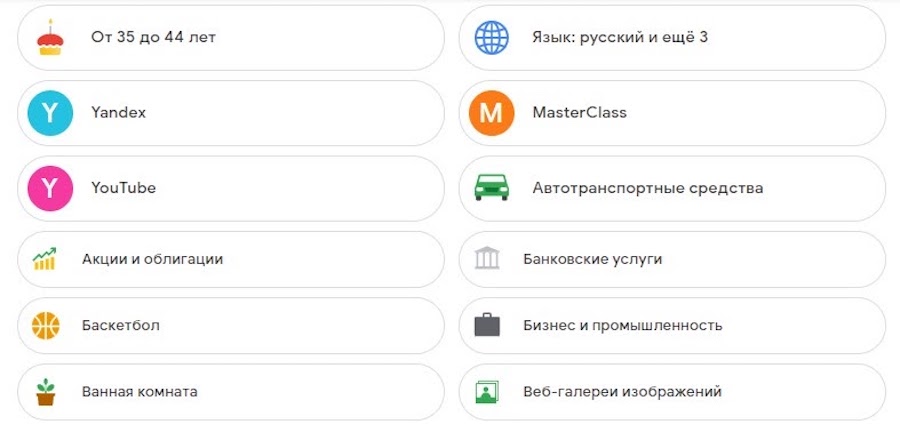Время на прочтение
2 мин
Количество просмотров 422K
Не желаете ли узнать о том, что Google знает о вас? Вот 6 ссылок, которые покажут вам некоторые данные, собранные гуглом.
1. Ваш профиль в Google
Google создаёт профиль с вашими основными данными – возраст, пол, интересы. Эти данные используются для показа релевантных объявлений. Вы можете просмотреть эту информацию здесь:
www.google.com/ads/preferences
(прим.перев. – в моём случае гугл не блещет информацией. Я не состою в Google+, а по посещённым мною сайтам гугл не смог определить мой пол, а возраст определил в 65+ лет).
2. История ваших перемещений
Если у вас есть устройство на Android, оно может отправлять ваш координаты и скорость в Google. Вы можете посмотреть свою историю перемещений и вывести её в файл:
maps.google.com/locationhistory
(прим. перев. – у меня таких устройств нет; можно полюбоваться историей перемещений читателя с reddit, который занимался доставкой пиццы)
3. Ваша история поиска в Google
Google может сохранять историю вашего поиска. Кроме того, он сохраняет историю объявлений, по которым вы кликнули. Всё это доступно здесь:
history.google.com
(прим. перев. – эту возможность надо включить в своём аккаунте)
4. Список устройств, получавших доступ к вашему аккаунту
Если вас интересует, не пользуется ли вашим аккаунтом кто-то ещё, вы можете посмотреть список всех устройств, которые получали к нему доступ, их IP-адреса и местоположение:
security.google.com/settings/security/activity
5. Список всех приложений и расширений, обращающихся к вашим данным в Google
Список всех приложений, у которых есть какой-либо доступ к вашим данным. Можно видеть, какие права у них есть и к чему у них есть доступ. Можно также отозвать этот доступ.
security.google.com/settings/security/permissions
6. Google на вынос
Можно экспортировать все ваши данные – закладки, почту, контакты, календарь, файлы с Drive, видео с youtube, фотки и прочее:
www.google.com/takeout
It can be unnerving to enter your own name into a search engine and see results about you that may include your address, age, phone number and more. You didn’t share that info with them — where did they get it? What are they using it for? Can you make them remove it?
Businesses and governments have been collecting information about people for centuries. William the Conqueror famously commissioned a record of property ownership in England back in 1085 called the Domesday Book. It wasn’t a detailed census, but it did include the names of people who owned property and where that property was.
Of course, those records were handwritten and few people could read, making access to the general public essentially nonexistent. Nowadays, many records are created digitally or digitized for easier access. This makes working with and sharing that information easier for everyone. Government data including vital records, tax information, voting details, salaries of government employees and more are required to be public by law. The laws differ by location on what must be made available, how much and when, but at least in the United States it’s probable that some, if not all, of those details are legally available. If William had had Zillow, there would have been no need for the Domesday Book.
Before everyone had access to the internet, someone would have had to go to the appropriate records offices (or in some cases mail a request) to get that information. Now with a little know-how, time and energy, it’s much easier to collect data that most people consider sensitive or even private. Many laws restrict how much information can be shared by an individual agency, but with a little from here and a little from there, someone can put together details and build a public profile about you.
If you’ve searched for your own name and found information about yourself on the first page, chances are you’re seeing results from sites called people finders. These sites take legally available information and build profiles that they make available online.
Many of these sites offer the user access to email, phone number or other identifying information (sometimes even your Social Security number) and things like your date of birth, home address, previous residences, your home’s valuation, the names of your relatives, your religion, your ethnicity, hobbies, places of employment, sites where you have accounts and a host of other personal details. These data brokers will often display a good bit of information for free, and provide lots of other information, including legal and criminal records, for a fee.
Contents
- Other Sources of Personal Data on the Web
- What Sorts of Data Collection Sites Are There?
- Can You Remove Your Data from a People-finder Site?
- Free and Cheap Ways to Monitor and Control Your Online Presence
Other Sources of Personal Data on the Web
Those are other potential sources of information beside people-finder sites. You may have shared your hobbies on social media or created a public wish list on a shopping site. Businesses of all kinds — even brick-and-mortar stores — sell mailing lists of their customers to others, too. Sometimes it’s easy to figure out whom, especially when the original misspelled your name and that misspelling starts popping up on junk mail.
If you’ve made a donation to one charity you might start receiving emails or letters from lots of other charities in the same space. Charities make additional money from selling their mailing lists to other charities. If you fill out a survey to enter a sweepstake, that could land you on another mailing list.
Some of this information may seem mundane, depending on your personal definition, but an unscrupulous person can use details that may seem trivial to you to put together a profile that they could use to commit fraud by catfishing. The person may seem to know details that only someone close to you could know, and that’s how they get you to trust them.
Catfishing is a concern, but on a day-to-day basis, it’s much more likely that someone is learning as much as they can about you to sell you something. We’re all becoming increasingly aware that websites track our online movements with cookies so that they can target us with advertising. The same thing happens with mobile apps for social networks. You probably gave them permission to do that when you accepted the terms and conditions of the service. You did read those terms before you clicked the Accept button, right?
You’re likely to see sites that offer to provide directory information about you, under the guise of white pages or people finders or background checkers or market research services, and then make your information available online.
The simplest way to find out what’s out there about you is to do searches for your name, email addresses and other identifying information. You can start with a search engine such as Google, but you’re likely to get an overwhelming amount of information unconnected to you — or about people who share your name or screenname. A search engine can be useful to see the top hits that your contact information yields, just to check on your online reputation. But searching the data collection sites will likely prove far more fruitful — and perhaps frightening.
What Sorts of Data Collection Sites Are There?
The internet is a very large network, and there are parts of it most of us don’t use every day. Some information about you might be on what some refer to as the surface web, made up of web pages to which other sites link and that can therefore be found by search engines like Google. But unlike typical search engines, data brokers — organizations that collect information and license these databases to others — glean much of the data they collect from what some people call the deep web or the dark web. The deep web consists of web pages and searchable databases, many of which no one links to and are not indexed by search engines. Actually, the deep web makes up the vast majority of internet real estate.
Some data brokers even make manual efforts to get official records on people. They can then aggregate your data into a detailed profile and display it online in one convenient location.
People-finder sites on the surface web are often divided into two categories: primary and secondary. Primary sites gather your information directly from primary sources, such as public records from government entities, utilities and the like. Secondary sites tend to get information from the primary sites and from other online locations, including other secondary sites and social networks. It’s not often clear whether a people-finder site is primary or secondary. Some of the most popular people-finder sites are Intelius, PeopleFinders, TruthFinder, BeenVerified, Spokeo and DOBSearch.
Take for instance Spokeo, a popular, user-friendly and sometimes eerily accurate people search site. From its home page, Spokeo allows you to search by name, email, phone or mailing address. Results will show up as blips on a map. You can drill down to your chosen person and get to a profile that displays tons of personal information, like previous addresses, family relatives and partial phone numbers. Searching is free, but access to more detailed information (like court records, social media profiles and complete phone numbers) is provided for a subscription fee.
This is only one example. There are hundreds of similar sites, with varying degrees of user-friendliness and accuracy, some affiliated with one another and some free agents.
The fact that entities are accumulating this type of data and making it readily available is obviously a big privacy concern. It makes misuses like stalking and identity theft easier. Plus, there’s the issue of inaccurate data. Many people finders post a disclaimer that they only collect information, they don’t check it for accuracy.
When there are many people with the same or similar names, or who have lived at the same addresses at different times, it can lead to the wrong information being connected to your profile on these sites. This may become a problem if you are interviewing for jobs or otherwise trying to make a good impression online. Many recruiters and hiring managers do online searches of people they are considering for jobs.
Most of the inaccurate information is probably innocuous, but it is not unknown for a site to do something like connect a criminal record with the wrong person. Not to mention that these sites might make it easier for your professional associates to find that unflattering drunken vacation photo a friend posted of you. For reasons of online privacy, safety and reputation, you may want to stay abreast of what private information is out there and make an effort to clean house.
Can You Remove Your Data from a People-finder Site?
There are a ton of these data aggregators; new ones pop up all the time and you can’t expunge all your public records, so the short answer is maybe not entirely. But you might be able to put a nice dent in the amount that is easily available online.
The good news is that many of the data collectors have ways to opt out and have your data removed from their sites by making a request online, by fax or via physical mail. Some require things like your email address for verification purposes or a copy of your driver’s license or other state ID to prove your identity, although having to send them more personal information may be disquieting. You can usually find opt-out instructions on their sites, often at the bottom of their home page, but there are places that gather lists of data brokers and their opt-out methods, if available, such as the Privacy Rights Clearinghouse.
The bad news is some of the data might re-aggregate on the sites you had expunged or pop up on other similar sites. Some people-finder sites may also have multiple listings for you due to name variations, misspellings and other issues, so you may have to do multiple searches and put in multiple requests.
Other factors that may affect your ability to control your information include the location of the company or the countries in which it does business. The California Consumer Privacy Act of 2018 requires companies to disclose what information they have about their customers, as well as the right to correct or remove it. Unfortunately, it’s really for California residents and doesn’t help non-residents as much.
The European Union’s General Data Protection Regulation (GDPR) is one of the toughest privacy policies in the world. Passed in May 2018, it applies chiefly to EU residents but also affects businesses that collect information on EU residents as customers. If you wonder why all of a sudden it seems like most websites launch pop-ups that ask you to agree to their privacy policies, it’s because those sites want to do business with European Union residents. The GDPR requires them to disclose what information they’re collecting and opt out of unnecessary tracking.
The GDPR also incorporates aspects of the EU’s previous so-called «right to be forgotten.» Essentially it says that EU residents have the right to ask organizations to delete their personal information, especially if it’s no longer being used for its original purpose. Privacy and security laws such as these are becoming more common around the world and may help you by limiting the amount and types of information available to data brokers.
In the event that you’ve submitted an opt-out request to a data broker in the United States and it reposts or fails to remove your data, the Federal Trade Commission (FTC) has some suggestions on how to take action. In 2022, the agency itself filed a lawsuit against one data broker accused of selling geolocation information that may reveal sensitive personal information. You can contact other governmental or political groups to help lobby for policy changes, such as making some of the more egregious practices illegal.
If asking a large number of sites to remove your data seems like a Herculean task, and you don’t want to wait for an act of Congress, there are growing numbers of sites that say they can delete your data from many of the data aggregators. Some of these providers include OneRep, DeleteMe, ReputationDefender and Kanary. Prices range from low monthly fees to hundreds of dollars, depending upon the company and level of service you require. Many of them have automated methods of finding and removing your data from the popular people-search sites. Some will also undertake manual methods for requesting removal if they can’t be achieved online, or advise you how to do it yourself, and alert you when your data pops up online again.
You might even find personal data on a regular website that isn’t a data aggregator, and there likely won’t be a formal removal process, but you may be able to contact the site owner and ask politely that your data be removed.
Free and Cheap Ways to Monitor and Control Your Online Presence
There are some other alternatives for monitoring and managing what’s out there about you online. BrandYourself is a free-to-inexpensive service that assists you in optimizing chosen links so that they rank higher in a Google search, or alternately de-optimizing links you want buried. Other companies, including some of the previously mentioned private data deletion sites, offer similar services. This practice doesn’t eliminate information but might allow you an amount of control over the first links people see when they search for you on the web, where they’re most likely to look.
Google has instructions on how to look for and remove your personal information online, as well as a form to use to request removal of content either from its search results or other Google properties. There are no guarantees, but it never hurts to try. You can also create a Google Alert for your name or other phrases people might use to find you and Google will email you when new instances of these search strings appear on the web. This isn’t a comprehensive way to tackle all the data on the web about you since the alerts are for new activity and it won’t likely send you anything that wouldn’t appear in regular search-engine results. But it can be a useful tool.
Other sites that generate alerts when your chosen monitoring topics appear online include Social Mention (part of BrandMentions), which tracks information about you or anyone else appearing on various social media sites, Social-searcher.com provides a similar service. Both websites say their service is free but there may be restrictions.
You can also take measures to make it harder for data gatherers to connect all of your information, such as setting strict privacy settings on social networking or other sites for which you sign up. Now might be the time to revisit your user accounts and check your settings. You should also check your profiles, blogs and other websites for private data that you may have posted and remove or change it for additional security.
Limit how much information is stored on you by using the incognito setting on your browser or switch to private search engines like Startpage or DuckDuckGo. These provide the same results as Google but they don’t store cookies related to your searches.
Keeping your most private data offline requires constant vigilance. In most cases, getting your information removed from a site does not erase the primary sources from whence it came. Such data could easily pop up again elsewhere. So, just as you should check your credit report every now and then, you might want to regularly peruse the Internet for your personal information. And take care what you post about yourself.
Originally Published: Jul 24, 2013
Personal Information Online FAQ
How do I stop my name from appearing in a Google search?
The easiest way to stop your name or personal information from appearing on Google search results is to contact the website owner where your information is published and ask them to remove it. Once they have removed it, Google won’t find the information to show in its search results.
How can I protect my personal data online?
You can use a Google service called “Me on the Web”, which allows you to search for where your personal information is listed online and to create Google Alerts for when your information is detected somewhere. This service will email you when new instances occur, making it easier for you to monitor your web presence. You can take other measures like setting strict privacy settings on social networking sites and other user accounts. Also, remove your private data from profiles, blogs and other websites for additional protection.
How does personal information get on the internet?
Personal information generally gets on the internet as publicly available information when an individual engages in routine business transactions, such as buying something online. Other information may come from federal and state public records, as well as from your social media accounts.
What happens if your personal information is leaked online?
It really depends what information is released. Personal information readily available online is a privacy concern, but there’s likely already some out there. However, detailed information like your address, identification number and credit card enables theft, stalking, identity theft and more.
Lots More Information
Related Articles
- Private Browsers Aren’t All Equally Private
- Can You Remove Your Personal Info From People-Finder Websites?
- What Does Browsing in Incognito Mode Really Do?
Sources
- Abine. (April 6, 2023) https://www.abine.com/
- Biersdorfer, J.D. «Q&A: Hiding From People-Search Sites.» New York Times. August 29, 2012. (April 6, 2023) http://gadgetwise.blogs.nytimes.com/2012/08/29/qa-hiding-from-people-search-sites/
- Carthy, Roi. «Pipl.com: People Search Engine So Good, It Will Scare Your Pants Off.» TechCrunch. January 29, 2009. (April 6, 2023) http://techcrunch.com/2009/01/29/piplcom-people-search-engine-so-good-it-will-scare-your-pants-off/
- Collusion. (April 6, 2023) http://collusion.toolness.org/
- Do Not Track. «Do Not Track Universal Web Tracking Opt Out.» (April 6, 2023) http://donottrack.us/
- Dunaway, Gavin. «Hulu Caught Respawning Cookies As ETags ETags Enter Tracking Fray.» Adotas. August 1, 2011. (April 6, 2023) https://web.archive.org/web/20180212094445/http://www.adotas.com/2011/08/hulu-caught-respawning-cookies-as-etags-enter-tracking-fray/
- Google. «Turn ‘Do Not Track’ on or off.» (April 6, 2023) https://support.google.com/chrome/answer/2790761?hl=en
- Google. «Remove your personal information from Google.» (April 6, 2023) https://support.google.com/websearch/answer/3143948
- Google. «Remove your personal information from Google.» (April 6, 2023) https://support.google.com/websearch/troubleshooter/3111061
- Hindman, Nate C. «Google Problems? BrandYourself Helps You Control Search Results of Your Name.» Huffington Post. March 21, 2012. (April 6, 2023) http://www.huffingtonpost.com/2012/03/21/google-problems-brandyourself_n_1369012.html
- Kessler, Sarah. «Getting Your Resumé Ready for Google.» Inc. October 1, 2010. (April 6, 2023) http://www.inc.com/magazine/20101001/getting-your-resume-ready-for-google.html
- Kessler, Sarah. «Google Launches Tool for Online Reputation Management.» June 16, 2011. (April 6, 2023) http://mashable.com/2011/06/16/google-me-on-the-web/
- Madrigal, Alexis C. «I’m Being Followed: How Google — and 104 Other Companies — Are Tracking Me on the Web.» Atlantic. February 29, 2012. (April 6, 2023) http://www.theatlantic.com/technology/archive/2012/02/im-being-followed-how-google-151-and-104-other-companies-151-are-tracking-me-on-the-web/253758/
- Mozilla. «How do I turn on the Do-not-track feature?» (April 6, 2023) https://support.mozilla.org/en-US/kb/how-do-i-turn-do-not-track-feature
- Osborne, Charlie. «How to delete yourself from internet search results and hide your identity online.» ZDNet. May 11, 2022. (April 6, 2023) https://www.zdnet.com/article/how-to-delete-yourself-from-internet-search-results-and-hide-your-identity-online/
- Ostrow, Adam. «TMI? TrueScoop Offers Free Public Record Search on Facebook.» Mashable. February 12, 2009. (April 6, 2023) http://mashable.com/2009/02/12/free-public-record-search/
- PeopleFinders. (April 6, 2023) http://www.peoplefinders.com/
- Pipl. (April 6, 2023) https://pipl.com/
- Raphael, JR. «People Search Engines: Slam the Door on What Info They Can Collect.» PC World. March 10, 2009. (April 6, 2023) http://www.pcworld.com/article/161047/people_search_engines_safety_tips.html
- Raphael, JR. «People Search Engines: They Know Your Dark Secrets…And Tell Anyone.» PC World. March 10, 2009. (April 6, 2023) http://www.pcworld.com/article/161018/people_search_engines.html
- Samuelson, Kristin. «Problem Solver: Should I be worried about Spokeo.com?» Chicago Tribune. May 28, 2010. (April 6, 2023) http://newsblogs.chicagotribune.com/the-problem-solver/2010/05/should-i-be-worried-about-spokeocom.html
- Schlitt, Carol L. «How Can I Remove My Name from an Online Database?» New York Law Thoughts. February 23, 2011. (April 6, 2023) https://web.archive.org/web/20140127022134/http://nylawthoughts.com/2011/02/23/how-can-i-remove-my-name-from-an-online-database/
- Singel, Ryan. «Spotify, Spokeo, AOL, Others Sued Over Web Tracking.» Wired. August 3, 2011. (April 6, 2023) http://www.wired.com/business/2011/08/tracking-lawsuit/
- Spokeo. (April 6, 2023) http://www.spokeo.com/
- Stine, Stephen. «Find People Using New Tools that Scour Web 2.0.» American Bar Association. (April 6, 2023) https://web.archive.org/web/20160725123132/http://www.americanbar.org/groups/departments_offices/legal_technology_resources/resources/articles/youraba0409.html
- Zabasearch. (April 6, 2023) http://www.zabasearch.com/
Администрация требует паспортные данные.
К нам домой приехал сотрудник Администрации, на преддомовой территории у нас колются дрова (лесовоз). Собственник дома-муж. Я даже прописана по-другому адресу. Потребовали для составления предписания мои паспортные данные, но паспорт был в машине у мужа, а тот на работе. Соответственно предложила подойти, когда муж будет дома и составлять какие-либо документы на собственника, но представитель Администрации отказался и составил предписание без паспорта на мои ФИО+номер телефона. В предписании указано: «собственник обязуется», но указаны мои данные без паспорта. Так же могли выписать нам предписание со слов соседки? В срок конечно же мы не уложились, но дрова убираются. Сейчас представитель администрации названивает и требует, чтобы я пришла к ним в Администрацию и принесла паспортные данные в ИХ РАБОЧЕЕ ВРЕМЯ. При этом я сообщила, что также в это время нахожусь на своем рабочем месте. Но данная информация никак не повлияла на разговор и представитель начал настаивать на моем приходе в Администрацию. Обязана ли я сообщать свои данные Администрации, если я не собственник и захочу съеду из этого дома, захочу снова заеду. Если проблему нужно решить им и выписать штраф, а бегать должна я?Как поступить в этом случае? Дом был приобретен в браке.
Читать ответы: 1
Вопрос от 28.09.2018
Как узнать о себе в интернете
В глобальной сети интернет есть информация о каждом из нас, даже если мы и не подозреваем об этом. В современном мире публичным человеком является практически каждый. Узнать, какая информация о вас уже навряд ли может считаться личной, можно с помощью сайтов-поисковиков.

Вам понадобится
- компьютер, подключенный к интернет
Инструкция
Откройте любой удобный для вас поисковый сайт (Google, Яндекс и т.п.)
Наберите в поисковой строке свои имя и фамилию в именительном падеже и нажмите кнопку поиска. Найденные станицы будут содержать упоминание вашего имени и фамилии, а значит — некоторую информацию о вас либо ваших тезках. Попробуйте таким способом поискать информацию о себе с помощью нескольких поисковых сайтов. Как правило, каждый из них выдает немного разный набор ссылок.
Продолжите поиск с использованием вашего имени, написанного латиницей, если вы участвуете в международных мероприятиях, общаетесь на Facebook или у вас есть друзья за рубежом. Ваше имя может найтись в архивах международного форума, в котором вы когда-то принимали участие, либо фигурировать в подписи к фотографии, которую сделал ваш иностранный друг.
Вспомните ники (сетевые прозвища), которые вы когда либо использовали. Вы могли давно позабыть их, а в интернете они по-прежнему «живы». Вполне возможно, кто-то из пользователей сети цитирует ваш блог, либо приводит ваше мнение, высказанное на форуме, в качестве экспертного. Это тоже часть вашего имиджа в интернете.
Обратите внимание
В интернете существует множество сайтов, предлагающих за деньги предоставить информацию о любом человеке. Использование подобных баз данных незаконно! Также подобные сайты очень часто являются носителями вирусных программ, опасных для вашего компьютера!
Полезный совет
Помимо web-поиска, можно так же заглянуть в раздел «картинки», там можно обнаружить собственные фотографии.
Если вы обнаружили в сети информацию, которую вам не хотелось бы демонстрировать широкому кругу людей — постарайтесь разобраться, каким образом ее можно удалить с сайта. Если у вас не получается сделать это самостоятельно — обратитесь к модератору. Излишняя публичность в сети может оказаться опасной!
Войти на сайт
или
Забыли пароль?
Еще не зарегистрированы?
This site is protected by reCAPTCHA and the Google Privacy Policy and Terms of Service apply.
Поисковые системы и крупные социальные сети знают о своих пользователях почти все — от модели смартфона до интересов. Рассказываем, зачем Google и Facebook эта информация и по каким ссылкам можно ее найти
Личная информация и интересы
Мы сами много рассказываем интернету о себе: в профиле указываем реальное имя и возраст, семейное положение, место учебы и работы. Поисковые системы и социальные сети анализируют информацию о пользователе, чтобы составить список его интересов и предлагать релевантные товары и услуги. Например, тем, кто часто путешествует, может постоянно попадаться реклама отелей, а те, у кого есть маленькие дети, видят в ленте скидки на детскую одежду и игрушки.
Где посмотреть рекламные интересы:
- В аккаунте Google — раздел «Настройки рекламных предпочтений».
- В приложении Instagram — раздел «Настройки» → «Безопасность» → «Доступ к данным» → «Реклама» → «Интересы».
- «ВКонтакте» — нужно скачать из социальной сети архив с личными данными и зайти в папку «Реклама».
- В профиле Facebook — раздел «Рекламные предпочтения».

Персонализированной рекламой в Google можно управлять, удаляя интересы, которые были присвоены вам ошибочно
(Фото: google.com)
Личные фотографии
По фотографии человека можно найти его страницы в социальных сетях, узнать имя, возраст и другие данные. Для этого нужно загрузить фото в приложение, которое с помощью искусственного интеллекта проанализирует изображение и выявит совпадающие с ним картинки в интернете.
Какие сервисы могут найти профиль пользователя по фото:
- Поиск по картинкам от Google.
- Поиск по картинкам от «Яндекса».
- Приложение Search4faces и его аналоги.
История поисковых запросов
Поисковые запросы, как и личная информация, помогают интернет-алгоритмам определять, чем интересуется пользователь и что ему нужно. Например, если вы несколько раз искали в Google или «Яндексе», где купить смартфон, система будет показывать баннеры магазинов электротехники.
Учитываются запросы не только в самих поисковых системах, но и в принадлежащих им сервисах. Если в YouTube вы часто ищете и смотрите обзоры гаджетов, Google на основе этой информации будет предлагать рекламу, связанную со смартфонами и другими девайсами.
Где посмотреть историю поисковых запросов:
- В аккаунте Google — раздел «Мои действия».
- В аккаунте «Яндекса» — раздел «История действий» (очистить историю запросов можно в настройках).
- В профиле Facebook — раздел «Журнал действий».

Текущее местоположение и история перемещений
Информация о местоположении поступает со смартфона, если в настройках поисковой системы или приложения пользователь разрешил отслеживать свои перемещения. Геолокация может автоматически привязываться к фотографиям и видео на устройстве.
Поисковые системы и социальные сети используют информацию о геолокации, чтобы подбирать актуальную рекламу. Находясь в путешествии в другом городе, вы можете увидеть в ленте, что рядом с вашим отелем есть кафе с недорогими ланчами. Также Google и «Яндекс» запоминают наиболее часто посещаемые места (например, дом и работа), чтобы в навигаторе или приложении такси пользователь мог быстро проложить маршрут к ним.
Где посмотреть информацию о местоположении:
- В аккаунте Google — раздел «Хронология».
- В аккаунте «Яндекса» — настройки аккаунта (в разделе «Отзывы» можно оценить места, в которых вы были).
- «ВКонтакте» — папка «Реклама» в скачанном архиве с данными профиля.
- В профиле Facebook — раздел «Журнал геоданных».

«Яндекс» предлагает пользователям оценивать места, которые они посетили
(Фото: yandex.ru)
Банковские карты
При оплате онлайн-покупок мы часто сохраняем банковские реквизиты на сайте, чтобы не вводить их каждый раз, или пользуемся системами электронных платежей, например Google Pay. Система хранит эту информацию в зашифрованном виде — увидеть защитный трехзначный CVV-код, дату выпуска и полный номер карты не получится, доступны только последние четыре цифры.
Где посмотреть банковские данные:
- В аккаунте Google — раздел «Способы оплаты» (в разделе «Покупки» можно посмотреть историю покупок, если они совершены через сервисы Google).
- В аккаунте «Яндекса» — раздел «Яндекс ID» → «Карты».
- «ВКонтакте» — раздел VK Pay.
- В профиле Facebook — раздел Facebook Pay.
История входов и информация о девайсах
Чтобы обезопасить аккаунт от взломов, почти все социальные сети фиксируют, когда, где, с какого IP-адреса и устройства заходил пользователь. Если авторизация кажется подозрительной, система может прислать уведомление, чтобы оповестить владельца профиля.
Где посмотреть историю входов и информацию об устройствах:
- В аккаунте Google — раздел «Ваши устройства»;
- В аккаунте «Яндекса» — раздел «Яндекс ID» → «Входы и устройства»;
- «ВКонтакте» — раздел «Безопасность»;
- В профиле Facebook — раздел «Журнал действий»;
- В приложении Instagram — раздел «Настройки» → «Безопасность» → «История активности».
Пароли и приложения
«Яндекс» и Google предлагают сохранять логин и пароль от сайтов и автоматически заполнять, чтобы в дальнейшем пользователю не пришлось снова вводить их вручную. Данные синхронизируются на разных устройствах.
Чтобы войти на некоторые сайты или в приложения, часто не нужно создавать отдельный аккаунт на этих сервисах. Можно авторизоваться через Google, Facebook, «ВКонтакте». После этого у приложения появляется полный или частичный доступ к данным аккаунта, через который был выполнен вход.
Где посмотреть сохраненные пароли и сервисы, у которых есть доступ к данным профиля:
- В аккаунте Google — раздел «Диспетчер паролей» и раздел «Google Аккаунт»;
- В аккаунте «Яндекса» — в приложении;
- «ВКонтакте» — раздел «Подключенные сайты и приложения»;
- В профиле Facebook — раздел «Приложения и сайты».

